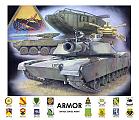Two simple examples, Somalia and Iraq, will suffice to show that an enemy can defeat at least one grid – in these cases our sensor grids -- and force us to fight from a position of information INFERIORITY.
The Somalis defeated our sensor grid by blending in with the civil population in Mogadishu. Our systems could not see inside the buildings nor tell the “good” guys from the “bad” guys when they were outside. All our sophisticated collection systems were unable to inform US commanders that the Somalis had developed an aggressive, well-developed defensive system to counter our raid tactics. We did not even know they had brought massive numbers of rocket-propelled grenades back into the city. As a result of the failure of our sensor grid, our commanders were completely surprised by the vigorous and rapid reaction to our early October raid. The result was 19 American dead and our withdrawal from Somalia.
Clearly the Somalis had Information Superiority. They knew what tactics we would employ; exactly where our forces were stationed; what routes we would use to reinforce the Rangers; how we would react to a helicopter shot down. They even knew the importance of immediate international media coverage of the event. They had a plan to get members of the media to the scene, get them to record it and get those pictures on the air.
Contrast the decisive Somalia action to the hesitant UN/US action and ask yourself which side had a superior understanding of the tactical and operational picture.
A second example where sophisticated sensors have not given us an advantage is the current crisis in Iraq. For all our tremendous capabilities, we do not know where Saddam’s weapons of mass destruction (WMD) are. We do not know how he will respond to air attacks. We do not know how the Arab masses will react to a sustained campaign. We don’t have his command and control system precisely located. The list of what we don’t know is longer than the list of what we do know. This is against an enemy we have focused on for over 7 years! Clearly, the fundamental uncertainty in war has not changed.
In the Iraq case, all three sensor girds failed. Our sensor grid failed to provide a perfect view of the battlefield. Our command and control grid has failed to provide a clear, coherent course of action and remains tied up in both internal and international debates about what that course of action should be. Finally, even if we had a course of action, our engagement grid might not be able to execute it. Our precision weapons are useless against targets we cannot locate. Even if the target is located, the precision weapons may not be useable due to political or humanitarian restraints. Saddam is an expert at placing military targets inside installations such as hospitals, mosques, etc. All three grids essential to Network-Centric warfare have been defeated by a not particularly well run Third World nation. The real world has shown that Network-Centric Warfare cannot guarantee and advantage.





 "A Sherman can give you a very nice... edge."- Oddball,
"A Sherman can give you a very nice... edge."- Oddball, 





Bookmarks